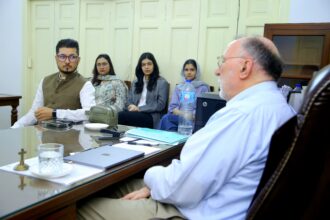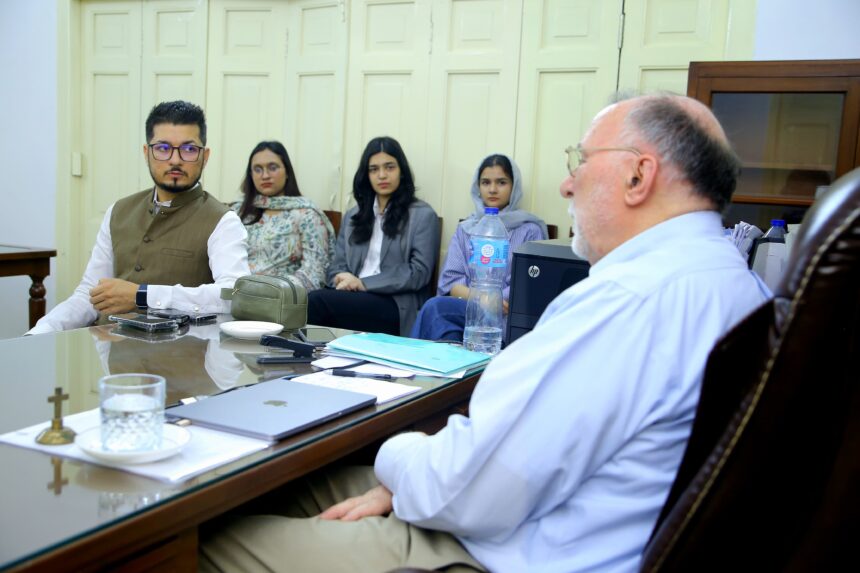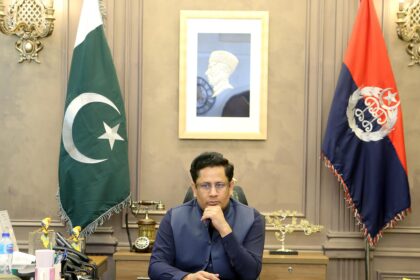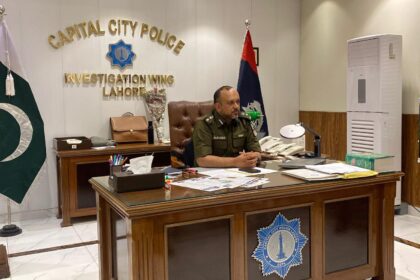JT: Tell us a little about your childhood in Pakistan—what it was like and the memories that stayed with you.
James A. Tebbe: I grew up on the Gordon College campus, where my father taught chemistry and later became Principal of FC College. We were four siblings. I had a very close relationship with one of my brothers—he was joyful, athletic, and deeply respectful. We had about 30–35 friends we’d play with, none of whom stayed in Pakistan. I’m the only one who came back.
There were some remarkable people around. One was Professor Wic—a poet who wrote in English and Urdu. He started a stamp collection drive, and despite his schedule, he always had time for us children. There was another biologist we were close to; he created a plant collection that’s still housed in Islamabad today.
I remember evenings on the hockey ground—professors would play or walk together. No campus unrest, no agitation. People studied hard and graduated well. Many went on to lead significant lives.
JT: Having experienced both Pakistani and American education systems, how would you compare them?
Tebbe: The contrast is sharp. Pakistan’s system, rooted in the British model, emphasised depth in a narrow field. The American system, where I studied later, was more expansive—focused on mass access and interdisciplinary learning.
Back then, Gordon College and similar institutions produced students who spoke impeccable English and were broadly educated. Today, education’s become overly competitive. We prepare for exams, not for life. Students can score an A in English but struggle to form a sentence. It’s all memorisation now.
When I studied at Punjab University, I saw that firsthand. In one exam, the invigilator stepped out, and students pulled out hidden notes. Not because they were dishonest—but because the system was built on rote memory, not understanding. Ironically, this helps Pakistani students abroad—they remember everything and often excel. But that’s not real education.
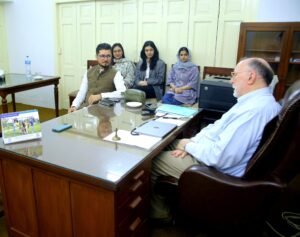
JT: You championed the liberal arts model at FCC, even though it was unfamiliar—and at times controversial—in Pakistan. Why?
Tebbe: Liberal arts changes lives. It gives students room to explore and discover where their true strengths lie. When I came back to Pakistan, I became a believer in it.
I once told a story in a speech: two young fish swim past an older fish who asks, “How’s the water?” The young ones swim on, then ask each other, “What’s water?” Liberal arts helps students become aware of the ‘water’ they’re swimming in—their environment, their assumptions. It teaches them to think critically—not to criticise, but to ask better questions.
People assume “liberal” means irreligious. But I’m a Christian and a conservative—and I fully support liberal arts. It’s not about being liberal in values; it’s about seeing the world through multiple lenses.
JT: Under your leadership, FCC made major academic and infrastructural strides. What was your approach to reform?
Tebbe: I believed we needed to change two things: how we teach and how we educate women. Educated women uplift families, and reform pedagogy lifts nations.
We established a Centre for Learning and Teaching to help faculty improve instruction. We prioritised teaching over research metrics, which is rare in this system.
One of the most complex efforts was beginning the process for international accreditation. We worked toward recognition by a U.S.-based body that also accredits institutions like Harvard and MIT. It wasn’t easy—there were constitutional challenges, repeated applications, and hesitations even from within. But eventually, we were accepted into the process. FCCU is not yet an accredited American university, but it’s now on that pathway. That alone is a big step for higher education in Pakistan.
JT: Your academic background includes interfaith work. What shaped your perspective on religious harmony?
Tebbe: When I came back to study, I wanted to pursue Islamic Studies but wasn’t sure if non-Muslims could enrol. I ended up studying Muslim History of the Subcontinent instead.
Later, at Princeton, I was exposed to teachers of all faiths—and even those with no faith. That kind of dialogue left a mark. When I became Rector, I made it clear that FCC would be a space of mutual respect.
We practised it, too. We’d start programmes with recitations from both the Quran and the Bible. I once had to remove two professors who were intolerant. Tolerance wasn’t optional—it was expected. One of our professors, an Ahmadi, said to me, “The only place I feel safe in Pakistan is FCC. Don’t change anything.” That meant a lot.
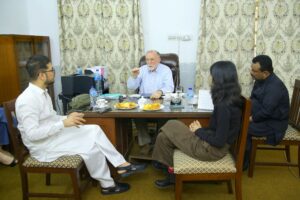
JT: Do you think Pakistan has changed socially over the years?
Tebbe: Some say Pakistan used to be better. But I believe there’s growth. What’s happening here—polarisation, social anxiety—is happening globally.
Still, I see promise in the youth. They’re intelligent and curious. If given good education and opportunities, they can change the country. Yes, there’s still prejudice, but there’s also growing awareness. People are beginning to realise that tolerance isn’t a luxury—it’s essential.
JT: As someone from a minority faith, you’ve had a certain privilege. How have you tried to use it to uplift Pakistan’s Christian community?
Tebbe: I’ve always believed in inclusive development. When I’d speak in American churches about scholarships, I insisted: fund both Christian and Muslim students. Some agreed; others hesitated. But my work was never about favouritism—it was about equity.
Pakistan’s Christian students often lack awareness of scholarships that are meant for them. We need better outreach. The talent is there. The dreams are there. But we have to create pathways.
JT: Pakistan’s blasphemy law has often been misused—especially against minorities. What are your thoughts?
Tebbe: It’s a tragic reality. I supervised a PhD thesis comparing how the law affects Christians and Ahmadis. The law began during the British era as a way to prevent communal violence. Today, it’s often misapplied—not just against minorities, but even among Muslims.
I’ve seen it firsthand. A Sunni businessman I know lost his brother in a factory dispute because someone weaponised religion. It’s not always about faith—sometimes it’s just a power struggle.
Legal aid is vital. Some colleagues have worked in brick kilns—where debt bondage is modern-day slavery. These families need not just help but hope.
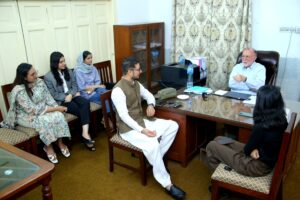
JT: How do you think international institutions—like the Presbyterian Church—can help?
Tebbe: They can help, but they must do so wisely. During my time, we partnered with foundations to provide scholarships to both Muslim and Christian students. But awareness is still lacking. Many students don’t even know they qualify.
The Outreach Foundation of the Presbyterian Church is doing meaningful work, though I’m more involved with the Church itself than with the Foundation now. But yes, the potential to bridge these gaps is there.
JT: Lastly, what message would you give to Pakistan about minorities and education?
Tebbe: At Princeton, we had “brown bag lunches”—you’d bring your lunch, sit down, and listen to someone speak. I remember one speaker said, “You want to understand a society? Look at how it treats its minorities.”
That stayed with me. Strong societies protect their vulnerable. That’s true in America, and it’s true in Pakistan. Education isn’t just about facts. It’s about learning to live together. Without tolerance, you cannot educate. Without love, you cannot build.
Postscript
As our conversation winds down, what remains most striking about James Tebbe is not just his commitment to education or his sharp critique of systems, but his quiet insistence that values—of dignity, dialogue, and love—are as foundational as any curriculum. In a country where polarisation often dominates headlines, his belief in inclusive reform and deeply humane leadership offers something both rare and necessary.



